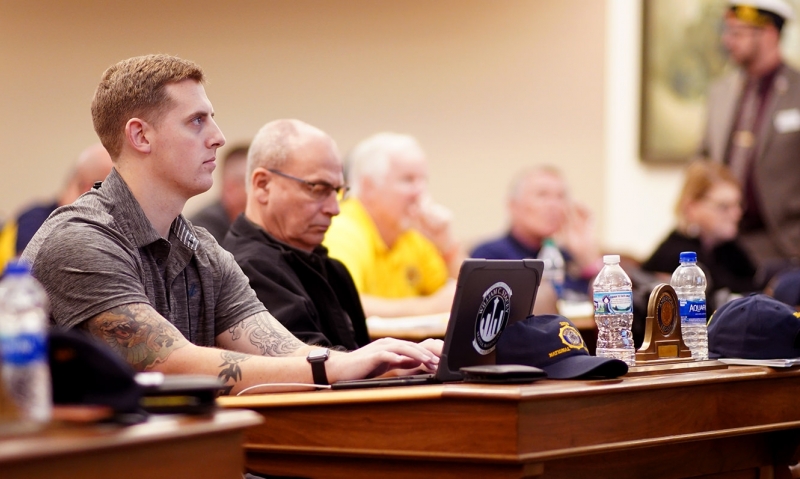
Legion College graduate and facilitator Dave Wallace shares best practices with the 55 students.
The 2018 American Legion National Legion College class was asked, on a scale of one to 10, how they would rate their post's overall membership engagement. A few hands raised at eight, and a few more at five. However, all 54 students raised their hand when asked if their post could improve upon what they do now for engagement.
“Engagement starts with knowing your members,” the class heard from Legion College facilitator David Wallace, a member of Post 180 in Vienna, Va., and a 2016 Legion College graduate himself. “If you’re going to engage, especially in today’s Legion life, Legion Family life, you need to focus on every Legion Family entity. If each of your entities are growing, so are you.”
Wallace shared five questions to ask when engaging a new member:
-
What is their family life? This creates potential for Legion Family membership if they are married or have children. And show them opportunities at the post for family involvement.
-
What is their vocation? Identify their skill set and where that may apply within the post.
-
What is their passion or hobby? This helps identify what programs or events they may want to be a part of.
-
What did they do while in service? This is an opportunity for mentoring. Pair them with a current post member who shares the same service history, to initiate mentorship and show the common bond they will have with other Legionnaires.
-
Why are they interested in The American Legion? They joined for a reason, so learn why and how they want to further their American Legion experience.
“The big thing - no matter if you’re asking these questions or anything else - when you’re engaging somebody, the most important thing, is to just ask. If you don’t do the just-ask part, no matter what the question is, you’re not going to engage that person,” Wallace said.
The 54 students representing 39 American Legion departments make up the centennial class. “That’s a legacy you can be proud of, but with that legacy comes the duty of being a guiding light to those who join and participate in our ranks,” said National Commander Brett Reistad during his remarks to the class on Tuesday. “You will be instrumental in engaging them, helping to chart our course for the next 100 years.”
Reistad encouraged the class to continue seeking mentorship from seasoned Legionnaires, as well as to be a mentor “to help you make The American Legion a better organization.”
Other ways to start the engagement process that were shared among the class were:
-
sending out a thank-you letter after a new member joins
-
hosting an initiation ceremony or new-member orientation
-
having a welcome brochure about your post home
“There’s nothing worse than signing somebody up and that’s it,” Wallace said.
Legion College student James Talaska of Post 100 in Illinois said his post has new members fill out a survey to know “what they’re interested in, what they’re good at, what they like and what they don’t like.” Then the post mentors the new member by pairing him or her with a seasoned Legionnaire who explains how The American Legion operates and what they do as a post. “We engage them.”
Wallace also reminded the class that media and communication is key to engagement – utilize social media channels, post website, post newsletter, etc., to share what your post is doing and when. And so is marketing in the effort to network in your community – create and post flyers around the community about post events; send press releases to the local newspaper; and join the National American Legion Press Association (NALPA) for best practices and resources on ways to promote your post and tell The American Legion’s story.
But engagement isn’t just for new members – it must continue with those who are renewing, looking to transfer posts, and with the longtime Legionnaire.
“Engagement is art. You are creating a landscape as to what The American Legion is to a new member, or why they should come to your post, or why they should continue to be a part of the Legion Family,” Wallace said.
Fifteen Legionnaires sit on Post 180’s executive committee. At 48, Wallace is the fifth-oldest with a full-time job and a young child at home.
“You need to keep those seasoned Legionnaires engaged and involved so your post is not missing out on events (during weekdays) like teaching first-graders how to properly fold a flag,” Wallace said. “They bring time, talent and expertise."
The Legion College class has been meeting at National Headquarters in Indianapolis since Sunday, where they have given a 30-second unrehearsed reason to join the organization; watched leadership-focused videos; learned how to run effective meetings and write resolutions; and more. Over the next few days they will learn to create "how-to" videos, develop their why of joining The American Legion, present their resolutions, and discuss assigned leadership scenarios that involve a post-level conflict.
- American Legion College

